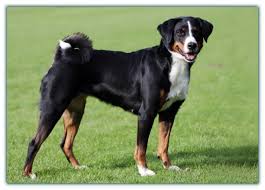
Appenzeller Sennenhund
Conditions of detention
Appenzeller Sennenhunds thrive in rural or suburban settings where they have plenty of space to roam and exercise. They are best suited to homes with large, securely fenced yards.
Useful Fact: They can adapt to indoor living but need plenty of outdoor activities to stay happy and healthy.
Nutrition and diet
A balanced diet of high-quality dog food appropriate for their age, size, and activity level is essential.
Useful Fact: Due to their high energy levels, they may benefit from a diet rich in protein to support their active lifestyle.
Health
The breed is generally healthy but can be prone to hip dysplasia and elbow dysplasia, as well as certain genetic eye conditions.
Useful Fact: Regular veterinary check-ups and screening for hip and elbow dysplasia can help maintain their health.
Grooming and care
The Appenzeller Sennenhund has a short, double coat that requires minimal grooming. Weekly brushing helps keep their coat healthy and reduces shedding.
Useful Fact: During shedding season, more frequent brushing can help manage their coat.
Education and training
They are intelligent and eager to please, making them relatively easy to train. Positive reinforcement methods work best.
Useful Fact: Early socialization and consistent training are crucial to harness their natural instincts and ensure good behavior.
Toys and entertainment
They enjoy toys that stimulate their minds and bodies, such as puzzle toys, chew toys, and activities that involve herding and agility.
Useful Fact: Regular playtime and mental stimulation are crucial to prevent boredom and destructive behaviors.
Safety
Provide a secure, fenced yard to prevent them from wandering off. Their strong herding instincts require supervision around small animals.
Useful Fact: Use a sturdy leash during walks to control their energy and herding instincts.
Accessories
Essential accessories include a comfortable bed, a sturdy leash and harness, food and water bowls, and grooming tools.
Useful Fact: Invest in durable toys that can withstand their strong jaws and high energy levels.
Socialization
Early and continuous socialization with different people, pets, and environments is crucial for developing a well-rounded dog.
Useful Fact: Puppy socialization classes can provide structured learning and interaction with other dogs
Travel and Transportation
They generally travel well but should be secured in a crate or with a dog seat belt for safety during car rides.
Useful Fact: Bringing familiar items, like their favorite blanket or toy, can make travel more comfortable for them.
Behavior and psychology
Appenzeller Sennenhunds are known for their energetic, intelligent, and loyal nature. They thrive on human interaction and can become anxious if neglected.
Useful Fact: Consistent routines and positive reinforcement help them feel secure and well-behaved.
Legal aspects
Ensure your pet is registered and compliant with local laws regarding vaccinations and licensing. Be aware of specific regulations regarding working breeds in your area.
Useful Fact: Microchipping your dog provides a permanent ID, increasing the chances of being reunited if lost.


